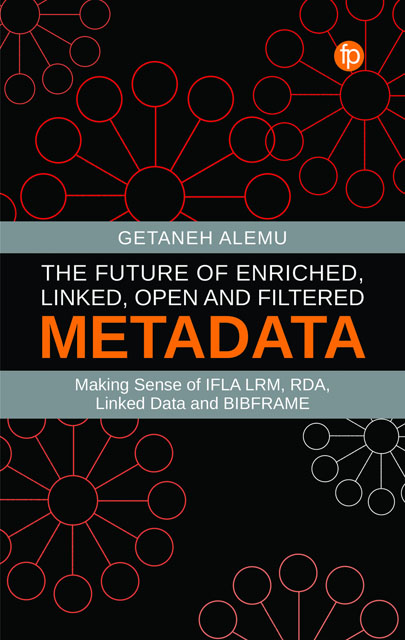 The Future of Enriched, Linked, Open and Filtered Metadata
The Future of Enriched, Linked, Open and Filtered Metadata Book contents
- Frontmatter
- Contents
- Figures
- Tables
- Code snippets
- About the Author
- Preface
- Acknowledgements
- Abbreviations
- 1 Introduction to Metadata
- 2 Metadata Strategies and Quality Indicators
- 3 Metadata Use Cases
- 4 Contemporary Metadata Principles
- 5 Enriched and Linked Metadata
- 6 Open Metadata
- 7 Filtered Metadata
- 8 FRBR, LRM and the Notion of Work
- 9 Resource Description and Access (RDA)
- 10 BIBFRAME: A New Metadata Framework
- 11 Crowdsourcing and User-Generated Metadata
- References
- Index
3 - Metadata Use Cases
Published online by Cambridge University Press: 18 November 2022
- Frontmatter
- Contents
- Figures
- Tables
- Code snippets
- About the Author
- Preface
- Acknowledgements
- Abbreviations
- 1 Introduction to Metadata
- 2 Metadata Strategies and Quality Indicators
- 3 Metadata Use Cases
- 4 Contemporary Metadata Principles
- 5 Enriched and Linked Metadata
- 6 Open Metadata
- 7 Filtered Metadata
- 8 FRBR, LRM and the Notion of Work
- 9 Resource Description and Access (RDA)
- 10 BIBFRAME: A New Metadata Framework
- 11 Crowdsourcing and User-Generated Metadata
- References
- Index
Summary
To carry knowledge to the doors of those thatlack it and to educate all to perceive the right!Even to give away the whole earth cannot equalthat form of service.
Manu (quotedin Ranganathan, 1957)Overview
In the light of metadata enriching and filtering,Ranganathan's five laws of library science could becontextualised and applied. The laws include:
1 Metadata is for use.
2 Every user their metadata.
3 Every metadata has its user.
4 Metadata saves the time of the user.
5 Metadata is a growing organism.
Metadata is for use
As Ranganathan (1957) argued, the first law of libraryscience (i.e. ‘Books are for use’) was oftenneglected to a deplorable degree, as books werechained to their shelves to guard and hoard them.‘Such chained books could not migrate from theshelves beyond the length of the chain’ (p. 2). Inthe past, all the folios at the Bodleian Library andall manuscripts at the library of the Abbey ofSaint-Victor in Paris were chained to desks toprotect them from unauthorised access and theft(Blair, 2010). With the proliferation of theprinting of books and the ability to make copies,the need to chain books has long gone. However,whilst we may abandon the practice of literalchaining, much cultural heritage content may stillbe locked away because it is invisible to users. Iflibraries and their books are for use, we mustmaximise this use by making resources discoverableand usable. If properly created and effectivelyused, metadata unlocks knowledge from its chains.‘Metadata liberates knowledge’, says DavidWeinberger. Metadata helps to make informationidentifiable, findable, discoverable and usable.Ranganathan notes that ‘the preservation rule oughtnot to usurp the books are for use rule’(Ranganathan, 1957).
Metadata helps to maximise usage of resources, and fora library, usage determines the return oninvestment. It is not worth keeping a book in thelibrary if it generates no usage. If no one uses itwithin a given period, it is essential to ask whythat happens. For a modern librarian, Ranganathannotes, it is not the books that are out that worrythem but the ones that are not checked out and notbeing used.
- Type
- Chapter
- Information
- The Future of Enriched, Linked, Open and Filtered MetadataMaking Sense of IFLA LRM, RDA, Linked Data andBIBFRAME, pp. 77 - 92Publisher: FacetPrint publication year: 2022
